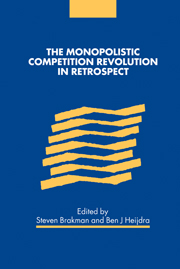Book contents
- Frontmatter
- Contents
- List of contributors
- Preface
- 1 Introduction
- Part I Underground classics
- Part II Current Perspectives
- Part III International trade
- Part IV Economic geography
- Part V Economic growth
- Part VI Macroeconomics
- 17 Monopolistic competition and macroeconomics: theory and quantitative implications
- 18 Does competition make firms enterprising or defensive?
- 19 Rationalisation and specialisation in start-up investment
- 20 Industrial policy in a small open economy
- Index
20 - Industrial policy in a small open economy
Published online by Cambridge University Press: 22 September 2009
- Frontmatter
- Contents
- List of contributors
- Preface
- 1 Introduction
- Part I Underground classics
- Part II Current Perspectives
- Part III International trade
- Part IV Economic geography
- Part V Economic growth
- Part VI Macroeconomics
- 17 Monopolistic competition and macroeconomics: theory and quantitative implications
- 18 Does competition make firms enterprising or defensive?
- 19 Rationalisation and specialisation in start-up investment
- 20 Industrial policy in a small open economy
- Index
Summary
Introduction
The pros and cons of industrial policy in an economy with increasing returns to scale industries have been debated time and again by both academic economists and policy practitioners. With the advent of the socalled New Trade Theory (Krugman, 1990), this debate has been given a new lease of life. At least two approaches can be distinguished in the recent literature. The first approach, which is mentioned but not pursued in this chapter, is better known under the name of ‘strategic trade policy’. In this branch of literature, the issue of industrial policy is studied in a setting of large duopolistic or oligopolistic firms battling for market share in the international economy (see Dixit, 1987 and Brander, 1995 for an overview and references).
The second approach studies the issue of industrial policy in a world characterised by monopolistic competition. In such a setting there is no strategic interaction between firms, and trade in varieties of a differentiated product takes place between countries. Flam and Helpman (1987), for example, construct a static model of a small open economy with a monopolistically competitive production sector. They use the model to study the effects on allocation and welfare of tariffs, export subsidies, R&D subsidies and output subsidies. Flam and Helpman (1987, pp. 90–1) identify three mechanisms by which welfare of domestic agents is increased in a monopolistically competitive setting.
- Type
- Chapter
- Information
- The Monopolistic Competition Revolution in Retrospect , pp. 442 - 484Publisher: Cambridge University PressPrint publication year: 2001
- 1
- Cited by



